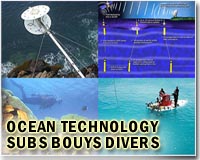| . |  |
. |
Buenos Aires (UPI) Jan 10, 2011 Argentine fisheries' production of squid this year is at risk after crews found the stock already low outside the country's exclusive economic zone. Low yields of the Illex argentinus variety of squid could spell trouble for this branch of the fishing industry, officials said. Last year, major rows broke out over what authorities and conservationists called indiscriminate fishing of existing stock of marine food resources in Argentine waters and beyond, mostly in zones operated by vessels from the industry. Critics blamed lack of good governance and transparency in the business of maintaining a balance between renewable fish stock and the crews operating in those areas for maximum profit. The limited presence of squid at mile 201, outside Argentina's EEZ, is of concern to the local squid jigger fleet, industry sources said. Fishing crews fear that something similar might happen in national waters, the sources said in published reports. The Fishing Information and Services alerted markets to the development in a news item on its Web site. Fishing vessels near the eastern limit of the EEZ caught just 2 tons a day of squid -- and that catch was dominated by small squids. Argentina is considering urgent changes in legislation to relieve the export duty burden on its fisheries exporters. Guillermo de los Santos, president of the Chamber for Jigger Fishing Shipowners of Argentina, blamed foreign fishing fleets. He said around 17 Chinese and 15 Korean ships with fishing licenses from the Falkland Islands were "catching very little, but more importantly, destroying stocks of the resource." Argentina has been campaigning for its sovereignty over the British-ruled Falkland Islands and has taken measures at sea to discourage shipping and trade involving the Falklands. Argentina and Falklands went to over the Falklands in 1982, with deaths of more than 1,000 fighters and civilians. De los Santos said low yield outside Argentine EEZ could lead to the Chinese in particular being allowed to operate within EEZ. Argentina recently signed agreements with China, a major trade partner for this Latin American country, giving the Chinese fleets greater rights to operate within the zone. However, whether the Chinese vessels operate in Argentina or sail further afield in search of higher yields, including those for Peru's giant squid, the Argentine squid industry could face a bleak future in view of the uncertainty over yields during the coming season, which begins February. The industry is already in trouble over sharp drop in yield over the past two years, FIS said in a report on its Web site. Argentine production in 2010 -- a total of 84,409 tons - was higher than the 2009 figure of 71,414 tons. Both volumes contrasted with 255,000 tons harvested in the 2008 season. Traders received some compensation in the rising price of squid. FIS reports showed that compared with previous years, catches of squid suffered serious fluctuations, leading to sharp price changes. In contrast to Argentina, Chile reported a 243 percent rise in landings of Dosidicus gigas giant squid. However, Chilean exporters also found themselves battling for export markets as the peso rose against the dollar, making Chilean exports overall less attractive. Fishing in Peru is also in crisis, with crews reporting sharp fluctuations in yields.
Share This Article With Planet Earth
Related Links Water News - Science, Technology and Politics
 Russian fishing boat sinks off Sakhalin
Russian fishing boat sinks off SakhalinMoscow (AFP) Jan 7, 2011 Two Russian boats and a jet scoured the country's stormy Far East seas Friday in a desperate search for at least 11 fishermen whose schooner sank off Sakhalin Island. The vessel's captain sent a last minute distress signal suggesting that the crew had been unable to deploy their life rafts on time and officials reported no progress in their initial bid to locate the craft. "Attention, at ... read more |
|
| The content herein, unless otherwise known to be public domain, are Copyright 1995-2010 - SpaceDaily. AFP and UPI Wire Stories are copyright Agence France-Presse and United Press International. ESA Portal Reports are copyright European Space Agency. All NASA sourced material is public domain. Additional copyrights may apply in whole or part to other bona fide parties. Advertising does not imply endorsement,agreement or approval of any opinions, statements or information provided by SpaceDaily on any Web page published or hosted by SpaceDaily. Privacy Statement |